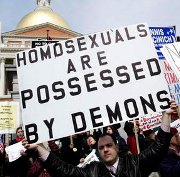 Dear GLAAD
Dear GLAAD
Let us first join with our supporters in saying to you: How dare you?


This probably won’t shock any of my readers, but I do not support Louisa Wall’s proposed amendment to the Marriage Act, which will make legally recognised same-sex marriage a reality in New Zealand.
The Marriage (Definition of Marriage) Amendment Bill recently passed its second reading in Parliament, and our ever-eager-to-say-they-made-a-difference politicians will almost certainly vote it into law this year. The new legislation would see the definition of marriage used by the Marriage Act 1955 expanded to include unions of two people of the same sex. Existing prohibitions would remain in place (e.g. close relatives still will not be able to marry), and the definition of marriage will not be broadened to include unions of more than two people.

Should religious people keep their divisive beliefs away from policies about marriage?
The green activists got up in arms about the introduction of genetically modified plants into the New Zealand market. But there is, as far as I can see, no widely lampooned caricature of people with environmental concerns as being socially divisive – in spite of those among their number who vandalised the farms of people suspected by them of having genetically modified crops. Large numbers of parents (the clear majority of those who voiced their opinion, in fact) raised their voices in protest when the government threatened to criminalise all use of any force in disciplining a child, while offering the benevolent promise that not all such criminals would be prosecuted (guess which way I lean on that). Parents were ignored and the law was changed, but more importantly here, nobody now thinks of parents as a uniquely divisive group within society. Many other people with common concerns or causes have likewise raised their voice in unison over other issues that concern them, but the fact that groups who do this in general do not get singled out as divisive or polarising is demonstrated by the way that just which groups spoke out over what issue is the kind of thing that tends to fade into obscurity in a relatively short time. But religion? Oh, that is different.
 With the furore over same-sex marriage gaining steam both in the United States and in New Zealand, where the issue is about to be debated in Parliament, I thought I should say a few things about that recent study that’s got some people upset – The study that said the things that we are all supposed to just know aren’t right and, more importantly, shouldn’t be said, that (stated in very general terms) children do better when they have, in their home life, a man who is their father and a woman who is their mother (as opposed to only one parent or parents of the same sex).
With the furore over same-sex marriage gaining steam both in the United States and in New Zealand, where the issue is about to be debated in Parliament, I thought I should say a few things about that recent study that’s got some people upset – The study that said the things that we are all supposed to just know aren’t right and, more importantly, shouldn’t be said, that (stated in very general terms) children do better when they have, in their home life, a man who is their father and a woman who is their mother (as opposed to only one parent or parents of the same sex).

Yesterday on Saturday the 3rd of September 2011, the Auckland Synod of the Anglican Church in New Zealand passed a motion that people involved in sexual relationships outside of marriage but within committed same-sex relationships would not be impeded from being ordained into ministry.
The mover of the motion was Glynn Cardy, notorious for his parish (St Matthews in the City) displaying billboards openly mocking historic Christian belief (I mentioned this a whole ago). Not terribly surprising I suppose!
Here is the motion:
That this Synod
[1] Holds that sexual orientation should not be an impediment to the discernment, ordination, and licensing of gay and lesbian members to any lay and ordained offices of the Church; and further
[2] persons in committed same-sex relationships likewise should not be excluded from being considered for discernment, ordination, and licensing to any lay and ordained offices of the Church.
[3] commits to an intentional process of listening to gay, lesbian, bisexual and transgendered people, organized by the Archdeacons in consultation with the gay and lesbian community.
[4] commits to an ongoing discussion with the ministry units, asks the Archdeacons to facilitate this, and invites responses to those discussions to be submitted to Diocesan Council by 31st March 2012; and
[5] commits to support the process and work of the Commission to be appointed by General Synod Standing Committee, as resolved at its meeting in July 2011.
It’s absolutely crucial to state: Prior to this motion being passed, there was no ban on homosexuals becoming ordained. None whatsoever. This is not about the church’s willingness to include people who identify as homosexual (some popular misrepresentations notwithstanding). This is about whether or not the church is right to refuse to ordain people who are living in a sexual union outside of marriage, something that the Christian faith has always disapproved of, regardless of anyone’s sexual orientation.

Recently I posted a couple of blog entries that made reference to homosexuality. I didn’t seek the subject out, it just popped up in current affairs due to the publicity surrounding a couple of recent studies. However, writing those two blog posts reminded me that I haven’t actually written a blog entry laying out what I think about the legal status of same sex marriage. Contributing at least partially to that end, I submit the following.
The following is not written to convince you that my view on the legal status of same-sex marriage is correct. All I intend to do here is to ensure that you know what my view on the legal status of same sex marriage is.

I have my share of concerns about the way some Christians view marriage and whether or not those views are really biblical, but that’s not what this blog post is about. Vorjack over at “Unreasonable Faith” has challenged the familiar appeal that Christians sometimes make to “biblical marriage” in their rejection of same-sex unions. He claims that this appeal is defective because marriage doesn’t just mean one thing in the Bible, it means eight different things. He writes,
Here’s a summary:
1. Polygynous Marriage
Probably the most common form of marriage in the bible, it is where a man has more than one wife.
2. Levirate Marriage
When a woman was widowed without a son, it became the responsibility of the brother-in-law or a close male relative to take her in and impregnate her. If the resulting child was a son, he would be considered the heir of her late husband. See Ruth, and the story of Onan (Gen. 38:6-10).
3. A man, a woman and her property — a female slave
The famous “handmaiden” sketch, as preformed by Abraham (Gen. 16:1-6) and Jacob (Gen. 30:4-5).
4. A man, one or more wives, and some concubines
The definition of a concubine varies from culture to culture, but they tended to be live-in mistresses. Concubines were tied to their “husband,” but had a lower status than a wife. Their children were not usually heirs, so they were safe outlets for sex without risking the line of succession. To see how badly a concubine could be treated, see the famous story of the Levite and his concubine (Judges 19:1-30).
5. A male soldier and a female prisoner of war
Women could be taken as booty from a successful campaign and forced to become wives or concubines. Deuteronomy 21:11-14 describes the process.
6. A male rapist and his victim
Deuteronomy 22:28-29 describes how an unmarried woman who had been raped must marry her attacker.
7. A male and female slave
A female slave could be married to a male slave without consent, presumably to produce more slaves.and of course …
8. Monogamous, heterosexual marriage
What you might think of as the standard form of marriage, provided you think of arranged marriages as the standard. Also remember that inter-faith or cross-ethnic marriage were forbidden for large chunks of biblical history.The important thing to realize here is that none of these models are described as better than any other. All appear to have been accepted.
So there you go. The next time someone says that we need to stick with biblical marriage in this country, you can ask them which of the eight kinds they would prefer, and why.
Someone who’s unwilling to be a cheerleader for scepticism but who actually a) knows enough to know whether or not the claims being made align with the facts and b) recognises poor reasoning when they see it, isn’t going to be impressed by this. But the reality is, material like this more often than not appears on websites or blogs where the visitors are likely to be visitors to the site because of their hostility to Christianity, and will be gleefully received as ammunition without much effort being taken to check its reliability. I’m sure similar things happen at some Christian websites too. I should say, too, that it is possible that Vorjack isn’t trying to be dishonest. He is merely reproducing material from another source – albeit with some additions of his own. I doubt that he is deliberately lying. I still say, however, that when you’re in a position to produce material to a large audience and peddle it as fact, you have a responsibility to exercise some care. This certainly wasn’t done in this case.
OK, here we go. This is the short version of what I found objectionable about the claims posted:
Powered by WordPress & Theme by Anders Norén